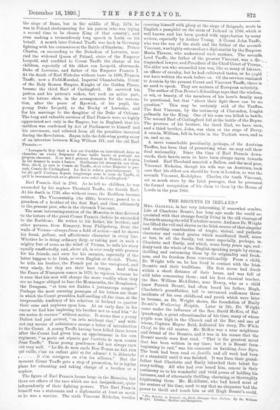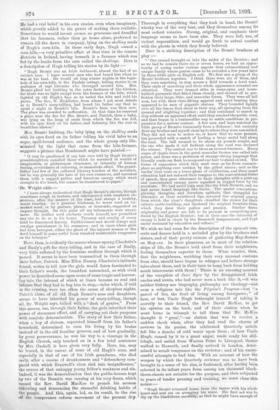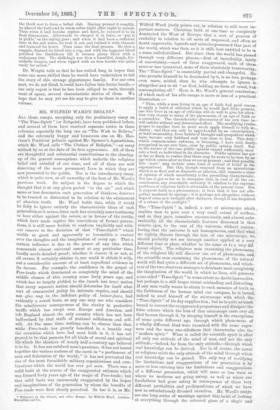THE BRONTES IN IRELAND.* The Brollies in Ireland ; or,
Facts Stranger than Fiction. By Dr. Withal* Wright. London, Hodder and Stoughton. MRS. GASKELL, in her very interesting, if somewhat somicre, Life of Charlotte Bronte, has long ago made the world ac- quainted with that strange family living in the old vicarage of Haworth among the wild Yorkshire moors. And now Dr. Wright has lifted the veil and shown us the Irish source of that singular and startling combination of tragic, stoical, and pathetic character and varied genius which manifested itself, more or less, in all the family, but more especially, perhaps, iii. Charlotte and Emily, and which, some forty years ago, slid- denly took the whole of the English-speaking people by stoma thrilling and entrancing them by its originality and fresh- ness, and its freedom from conventionality. From a child,' Dr. Wright tells us, he has lived in contact with the Irish Brontës and their traditions. His first nurse had dwelt within a short distance of their house, and was full of wild tales concerning them ; and his first classical teacher, . the Rev. William McAllister, near Newry, who as a child knew Patrick Brontë, had often heard his father, Hugh,. Charlotte's grandfather, tell to entranced audiences those incidents of his own childhood and youth which were later to become, as Dr. Wright shows, the foundation of Emily Bronte's Wutliering Heights. Later in life, Dr. Wright' came under the influence of the Rev. David McKee, of Bal ly-naskeagh, a great educationalist of his time, many of whose pupils rose high in the Church and at the Bar, and one of whom, Captain Mayne Reid, dedicated his story, The White Chief, to his old master. Mr. McKee was a near neighbour and friend of the Brontës, and it was in his manse that the Bronte novels were first read. "That is the greatest novel that has been written in my time; but it is Brontii from beginning to end," was his comment on finishing Jane Eyre/ The book had been read en famille, and all work had been at a standstill until it was finished. It was from their grand-' father that Charlotte and Emily inherited their talent for story-telling. All who had ever heard him, concur in their testimony as to his wonderful and vivid power of holding his listeners, and of alternately thrilling, charming, or thoroughly frightening them. Mr. McAllister, who had heard most of the orators of his time, used to say that no eloquence had the power to thrill and touch him as old Hugh Bronte's could. He had a real belief in his own stories, even when imaginary, which greatly added to his power of making them realistic. Sometimes he would invent scenes so gruesome and dreadful that his listeners, rather than go home alone, preferred to remain till the dawn in company, lying on the shelling seeds .of Hugh's corn-kiln. In those early days, Hugh owned a corn-kiln,—e, very primitive affair at that time in the remote 'districts in Ireland, having beneath it a furnace which was fed by the husks from the oats called the shellings. Here is a description of Hugh telling his stories by its light :— " Hugh Brontë was an Irish hakkaweiti, almost the last of an extinct race. I knew several men who had heard him when he was at his best. He would sit long winter nights in the logie- hole of his corn-kiln, in the Emdale cottage, telling stories to an audience of rapt listeners who thronged around him. Mrs. Bronte plied her knitting in the outer darkness of the kitchen, for there was no light except from the furnace of the kiln, which lighted up old Hugh's face as he beaked the kiln and told his -yarns. The Rev. W. McAllister, from whom I got most details as to Bronte's story-telling, had heard his father say that he spent a night in Brontli's kiln. Bronto's fame was then new. The place was crowded to suffocation. At that time he reserved a place near the fire for Mrs. Brontë, and Patrick, then a baby, was lying on the heap of seeds from which the fire was fed, with his eyes fixed on his father, and listening like the rest in breathless silence."
Mrs. Bronto knitting, the baby lying on the shelling seeds with its eyes fixed on its father telling his vivid tales to an eager, spell-bound audience, and the whole group only illu- minated by the light that came from the kiln-furnace, suggests a picture that Rembrandt might have painted :— " It may be questioned if any tale ever told by Hugh Bronte's
• granddaughter equalled those which he narrated in wealth of
• imagination, or picturesque eloquence, or intensity of human feeling, or vividness of colouring, or immediate effect. The grand- father had few of the cultured literary touches of the novelists, but he was generally the hero of his own romances, and narrated - them with a rugged pathos and ferocious energy which went straight to the heart, but cannot be transferred to paper."
iDr. Wright adds :— "1 have always understood that Hugh Bronte's stories, though sometimes rough in texture, and interspersed with emphatic ex- pletives, after the manner Of the time, had always a healthy, moral bearing. As a genuine Irishman, he never used an im- modest word, or by gesture, phrase, or innuendo, suggested an impure thought. On this point all my informants were unani- mous. He neither used unchaste words himself, nor permitted any one to do so in his house. Tyranny and cruelty of every kind he denounced fiercely. Faithlessness and deceit always met condign punishment in his romances ; and in cases where girls had been betrayed, either the ghost of the injured woman or the devil himself in some awful form wreaked unutterable vengeance on the betrayer."
Here, then, is evidently the source whence sprang Charlotte's and Emily's gift for story-telling, and in the case of Emily, • very little softened by the feminine medium through which it passed. It seems to have been transmitted to them through their father, Patrick. Miss Ellen Nussey, Charlotte's intimate friend, writes to tell how the girls would listen fascinated to their father's words, the breakfast untouched, as with vivid power he described scene upon scene of some tragic and harrow- ing tale, the interest of which at times became so real and intense that they had to beg him to stop,—tales which, if told in the evening, were too often the cause of sleepless nights. Patrick alone, of all old Hugh Bronte's sons and daughters, Seems to have inherited his power of story-telling, though all, Dr. Wright says, talked with a "dash of genius." From this source, too, through their father, the girls inherited their power of strenuous effort, and of carrying out their purposes with resolute determination. The story of how their father, When a boy of sixteen, separated himself from his father's household, determined to earn his living by his brains instead of in the old familiar grooves, and of how gradually, by great perseverance, he won his way to a vicarage in the English Church, only touched on in a few brief sentences by Mrs. Gaskell, is here given very fully. Here, too, may be traced, in the career of some of old Hugh's sons, and especially in that of one of his Irish grandsons, who died early, after a course of drunkenness and "debauchery com- pared with which Branwell's vices sink into insignificance," the source of that unhappy young fellow's weakness and sin. Indeed, it was the demoralisation that the public-houses kept by two of the Brontës was causing at his very doors, which roused the Rev. David MacKee to preach his sermon ridiculing and denouncing the shameful drinking habits of the people. And this, again, led, as its result, to the rise ,of the temperance reform movement of the present clpy. Thorough in everything that they took in band, the Bront6 whisky was of the very best, and they themselves among its most ardent votaries. Strong, original, and emphatic their language seems to have been also. They were full, too, of violent superstition, and would go forth to actual combat with the ghosts in which they firmly believed.
Here is a striking description of the Brontë brothers at play :— " • Our errand brought us into the midst of the Brontes ; and as we had to remain there six or seven hours, we had an oppor- tunity of seeing under various aspects that extraordinary and unique family whose genius came to be revealed a few years later by three little girls on English soil. We first saw a group of the Bronte brothers together. I think there were six of them, and they were marching in stop across a field towards a level road. Their style of marching and their whole appearance arrested our attention. They were dressed alike in home-spun and home- knitted garments that fitted them closely, and showed off to per- fection their large, lithe, and muscular forms. They were all tall men, but with their close-fitting apparel and erect bearing they appeared to be men of gigantic stature. They bounded lightly over all the fences that stood in their way, all springing from the ground and alighting together; and they continued to march in step without an apparent effort until they reached the public road, and then began in a businesslike way to settle conditions in pre- paration for a serious contest. A few men and boys watched the little group of Brontes timorously from a distance ; but curiosity drew my brother and myself close up to where they were assembled. They did not seem to notice us, or know that we were present, but proceeded with a match of hurling a large metal ball along the road. • The ball seemed: to be about six pounds weight, and the one who made it roll farthest along the read was declared the winner. The contest was to them an earnest business. Every ounce of elastic force in the great muscular frames was called into action, and there was a profusion of strange strong language that literally made our flesh to creep and our hair to stand on end. The forms of expression which they used were as far from common- place as anything ever written by the gifted nieces ; and' as the uncles' lives were on a loweeplame of civilisation, and their scant education had not reduced their tongues to the conventional forms of speech, they gave utterance to their thoughts with a pent-up and concentrated energy never equalled in rugged force by the novelists. We had never seen men like the Irish Brontes, and we had never heard language like theirs. The quaint conceptions, glowing thoughts, and ferocious epithets, that struggled for utterance at their unlettered lips, revealed the original quarry from which the vicar's daughters chiselled the stones for their artistic castle-building, and disclosed the original fountain from which they drew their pathos aud passion. Similar fierce originality and power are felt to be present in everything pro- duced by the English Brontiis ; but in their case the intensity of energy is held in check by the Bramwell temperament, and kept under restraint by education and culture."
We wish we had room for the description of the open-air con- certs and dances held in a secluded glen by the brothers and sisters, and of their pretty custom of gathering May-flowers on May-eve. In their pleasures, as in most of the relation- ships of life, the Brontes held aloof from their neighbours, feeling themselves superior to them. What wonder, then, that the neighbours, watehing their very unusual customs from afar, should have begun to whisper and believe strange tales about them, and in their turn to hang back from holding much intercourse with them There is an amusing account of the reception of Jane Eyre by the disappointed Irish uncles and aunts, who had never seen a book like it,—it was neither history nor biography, philosophy nor theology—not even a religious tale like the Pilgrim's Progress—but "a parcel of lies, the fruit of living among foreigners ; " of how, at last, Uncle Hugh bethought himself of taking it secretly to their friend, the Rev. David McKee, to get his opinion on the book, and of their elation when he went home in triumph to tell them that Mr. McKee thought it "gran',"—an elation that was to receive a sudden check when, after they had read the chorus of 'reviews in its praise, the celebrated Quarterly article fell like a douche of cold water upon them ; of how Uncle Hugh, roused by it to a great anger, made ready his shil- lelagh, and sailed from Warren Point to Liverpool, thence walked to Haworth, and finally arrived in London, deter- mined to wreak vengeance on the reviewer ; and of his unsuc- cessful attempts to find him. • With an account of how the weapon by which the Quarterly reviewer was to have been brought to a sense of his Sins, is fashioned, after having been selected in its infant years from among ten thousand black- thorn-shoots not suitable for the purpose, and then subjected to years of tender pruning and training, we must close this notice :— • , "Hugh Drente returned home from the manse with his whole heart and soul set on avenging his niece. His first act was to dig up the blackthorn carefully, so that he might have enough of
the thick root to form a lethal club. Having pruned it roughly, he placed the butt-end in warm ashes night after night to season. Then when it had become sapless and hard, he reduced it to its final dimensions. Afterwards he steeped it in brine, or put it in pickle,' as the saying goes ; and when it had been a sufficient time in the salt water, he took it out and rubbed it with chamois and train-oil for hours. Then came the final process. He shot a magpie, drained its blood into a cup, and with the lappered blood polished the blackthorn till it became glossy black with a mahogany tint. The shillelagh was then a beautiful, tough, for- midable weapon, and when tipped with an iron ferrule was quite ready for action."
Dr. Wright tells us that he has waited long in hopes that some one more skilled than he would have undertaken to tell the story of this strange gigantesque family. For our own part, we do not think it could have fallen into better hands,— our only regret is that he has been obliged to omit, through want of space, several characteristic stories of them. We hope that he may yet see his way to give us these in another volume.












































 Previous page
Previous page